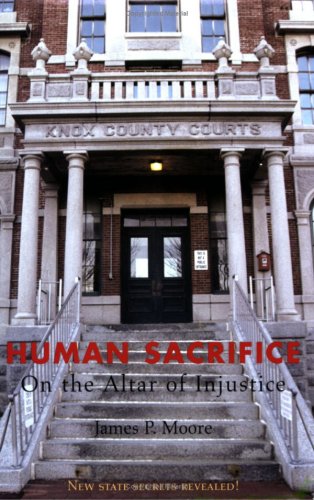Trial and Error
The Outcry for Justice in the Dennis Dechaine Case
Trial & Error Newsletter - May 2017
Dear Supporters:
Carol’s PC is the only computer that is able to distribute our newsletter. The initial delay in sending out this newsletter was caused by her computer’s malfunction. Then, far worse, Carol’s husband Jesse was diagnosed with lung cancer, and while Carol was in Philadelphia, where Jesse is being treated, the computer was back in Madawaska. Now the computer has joined Carol and Jesse in Philadelphia.
**********
A gofundme page for Jesse may be found at https://www.gofundme.com/cancer-sucks-help-jesse-fund
************
LD677, the proposed law described in the last newsletter, failed to win any support in the Judiciary Committee. To review :
Our legal system is based on the concept that a defendant is innocent until proven guilty beyond a reasonable doubt. While this is an admirable concept, as with anything carried out by fallible humans, it is far from perfect in practice.
Contrary to public belief, most appeals of a guilty verdict review whether the procedural rules were followed correctly, and not the merits of the evidence presented.
Once a defendant has been found guilty everything changes ; now a convict, he or she is considered guilty unless proved innocent, and rules limit the evidence that can be entered into an appeal in support of a claim of innocence. Two such rules limit the time between when new evidence was discovered and when an appeal is filed, and whether such evidence could have been discovered earlier through “due diligence.”
The obligation to bring forward new evidence in a timely fashion, and to have employed due diligence, bears on the convict whom is stuck behind bars, and who may have little legal knowledge, and not on his or her lawyer, except in extreme cases of “ineffective counsel.” Also, the judge ruling on the appeal, as in Dennis’s case, may be the trial judge with his or her own interests in the outcome. Which is to say, that even if evidence clearly indicates that a wrongful conviction has occurred, it may well not be considered.
In an attempt to remedy this situation a number of states have passed statutes allowing for “claims of actual innocence,” under which, within certain guidelines, a convicted person can ask for a review of ALL the exculpatory evidence in his or her case, in an appeal for a new trial. LD677 was based on these precedents. The summary of LD677 from the Legislature’s Office of the Revisor read:
This bill amends the statutory provisions regarding criminal post-conviction review
13 to allow the filing of a petition for post-conviction review claiming actual innocence at
14 any time during the period of direct impediment, except that it may not be filed within
15 one year of a judgment on a prior petition for post-conviction review on the same
16 conviction. This bill requires that a petition for post-conviction review claiming actual
17 innocence receive at least one evidentiary hearing in which the petitioner may submit
18 new evidence and evidence submitted in prior proceedings on the same matter.
Those testifying on behalf of LD677 at the hearing included our steadfast friend, Dennis Curley, who drove down from The County for his several minutes on the stand. Also testifying were representatives from the ACLU of Maine and from MACDL (Maine Association of Criminal Defense Lawyers). Testimony from the New England Innocence Project and from former prosecutor and attorney general Jon Lund, as well as from T & E board member Bernie Huebner, was also presented.
Speaking in opposition to LD677 were Assistant Attorney General Donald Macomber and District Attorney Maeghan Maloney. Macomber claimed that the passage of LD677 would tie up the system, while Maloney claimed that judges will recuse themselves from controversial cases. There were a number of spirited questions from committee members directed at Macomber and Maloney.
The Judiciary Committee’s “work session” for LD677 took place on April 13. As is customary, the committee’s policy analyst began by presenting a summary of the bill. Near the end she added – this is a direct quote from a transcript -- “The Attorney General’s office pointed out to me today that there IS a way you can use the current law to make a filing that this bill would cover. It’s in section 2128-B .”
However, in fact, section 2128-B begins: “A one- year period of limitation applies to initiating a petition for post-conviction review seeking relief from a criminal judgment under section 2124, subsection 1 or 1-A. “
The one year limitation was one of the principal limitations which LD677 was intended to remove!
With no pertinent discussion, a motion for a vote of “ought not to pass” was entered, which passed twelve to nothing.
Attorney General Janet Mills and Chief of the Criminal Division Lisa Marchese were both present in the room.
*************
Dennis continues to keep busy and is doing well, under the circumstances. In fact, he complains that there are not enough hours in the day. In addition to his work in Prison Industries, he is acting as an advisor to Warden Liberty’s ambitious gardening program, is working with inmates on some progressive prison reforms, and has undertaken, once again, to teach a French class.
*************
Once again, we thank you for your continued support and ask that you forward this newsletter to everyone in your mailing list.
Donations, suggestions and any information you may have that can help this cause, please feel free to forward to Trial and Error PO Box 153 Madawaska Maine 04756.
Sincere Thanks,
Carol Waltman
Bill Bunting
Bernie Heubner
Bob MacLaughlin
Steve Sandau
Eugenie Nakell
Nancy Farrin
Donald Dechaine
